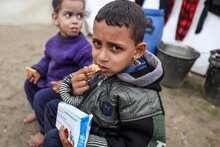WFP Funding Crunch In Palestine Threatens Food Voucher Assistance
This is at the same time as a major energy crisis is affecting the impoverished Gaza Strip.
WFP urgently requires US$6.6 million to provide food assistance through vouchers for the next three months to the poorest non-refugee families in Gaza and the West Bank.
“The suspension of our food assistance will have dramatic consequences on the poorest people, whose hardships show no sign of abating,” said WFP Representative and Country Director in Palestine Daniela Owen. “Every dollar counts to avert a deepening humanitarian crisis with damaging spill-over effects on security and stability.”
The energy crisis has eroded people’s purchasing power and increased the prices of basic essentials. The poorest families, including those assisted by WFP, are affected the most. Critical services in Gaza, such as health, water and sanitation, are no longer available after the shutdown of the sole power plant.
WFP is seriously concerned about the potential interruption of its food assistance to 92,000 people in Gaza, which is provided in partnership with the Ministry of Social Development and Global Communities, an international non-governmental organization. Credited with US$10.30 per person each month, WFP vouchers allow families to buy essential nutritious and locally-produced food.
A disruption of WFP assistance would further undermine food security and deepen the dire living conditions of the poorest families, most of whom live on less than US$3.20 per day.
In the West Bank, where WFP provides vouchers to 57,000 people in cooperation with the Ministry of Social Development, slow economic growth and movement restrictions on people and goods continue to limit people’s employment opportunities. As food accounts for more than half of the budget of vulnerable people in these areas, WFP assistance is critical.
Food insecurity in Palestine is driven by high unemployment and people’s limited ability to purchase food. Today, more than a quarter of the Palestinian population – or 1.6 million people – require food assistance. In Gaza, where the unemployment rate exceeds 40 percent, more than 46 percent of people require food assistance.
Over the first quarter of 2017, WFP provided food assistance through vouchers and direct distributions to nearly 480,000 poor people each month, with more than 40 percent through food vouchers. WFP vouchers contribute to the economy and local markets in Gaza, through the use of shops for purchase and distribution of locally-produced commodities.
Since 2011, WFP has injected more than US$146 million into the Palestinian economy through vouchers, including US$63 million in Gaza. WFP vouchers have had a positive economic impact, resulting in increased sales and investments while creating jobs in the retail, dairy and farming sectors.
# # #
WFP is the world's largest humanitarian agency fighting hunger worldwide, delivering food assistance in emergencies and working with communities to improve nutrition and build resilience. Each year, WFP assists some 80 million people in around 80 countries.
Follow us on Twitter @WFP_MENA
For more information on WFP activities in Palestine, visit http://www.wfp.org/countries/palestine
For more information please contact (email address: firstname.lastname@wfp.org):
Raphael Duboispean, WFP/Jerusalem, Mob. +972 546773160
Yasmine Abuelassal, WFP/Jerusalem, Mob. +972 546773170

